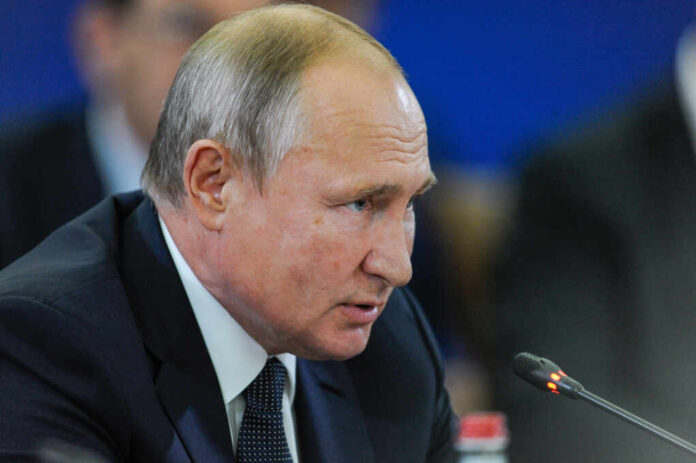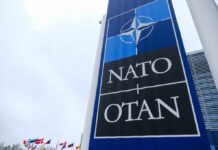
Putin’s threats to target Western troops in Ukraine collide with Trump’s push for direct Russia-Ukraine talks.
Story Snapshot
- Putin declares Western troops in Ukraine would be “legitimate targets,” escalating risks if Europe intervenes.
- President Trump sets a two-week deadline for Russia to begin peace talks, but no progress is achieved.
- European leaders weigh troop deployments and security guarantees for Ukraine with Trump’s envoy present at negotiations.
- Trump seeks a direct summit between Putin and Zelenskyy, but Russian terms remain unclear and attacks continue.
Putin’s Threats Heighten Tensions Over Western Military Involvement
Russian President Vladimir Putin has explicitly warned that any deployment of Western troops in Ukraine would make them “legitimate targets,” signaling a dramatic escalation in rhetoric and potential military risk. This statement comes as European leaders, frustrated by Ukraine’s ongoing vulnerability, consider direct military support, including possible deployment of troops and air defense assets. Such threats are not new, but Putin’s recent language underscores Moscow’s resolve to deter Western intervention by painting it as an act of aggression, which could trigger wider conflict and threaten U.S. interests abroad and at home. These developments place constitutional principles—especially regarding national sovereignty and security—at risk as global actors debate intervention.
Putin warns Western troops in Ukraine will be ‘legitimate targets’ for Russia
‘If any NATO troops appear in Ukraine, especially now, during the course of military operations, we will proceed from the fact that these will be legitimate targets for their destruction. And if… pic.twitter.com/00P7TKI1eX
— Ignorance, the root and stem of all evil (@ivan_8848) September 5, 2025
On the heels of Putin’s warning, the Trump administration is taking an assertive diplomatic approach. At the August 2025 Alaska summit, President Trump imposed a two-week deadline for Russia to begin peace negotiations, stressing the possibility of “severe consequences” if Moscow refuses. Despite Trump’s pressure, Russia carried out further strikes, including a deadly attack on a U.S.-linked factory and a missile barrage in Kyiv that killed over twenty civilians. The expiration of Trump’s deadline without progress highlights the stubbornness of Russian escalation and the limits of Western leverage, even as diplomatic efforts intensify.
Watch; Putin says any Western troops in Ukraine would be “legitimate targets for destruction”
European Security Guarantees and U.S. Diplomacy Reshape the Ukraine Crisis
Early September saw a pivotal meeting in Paris, where European coalition leaders and Ukrainian President Zelenskyy discussed new security guarantees. These include troop deployments and expanded military assistance, all amid rising public demand for a more robust Western response. Trump’s envoy participated in these talks, signaling a shift toward increased European responsibility and less direct U.S. military involvement.
Trump’s strategy also prioritizes direct negotiation. He is actively arranging a bilateral summit between Putin and Zelenskyy, arguing that only face-to-face dialogue can unlock progress. However, Russian terms for such a meeting remain ambiguous, and Ukrainian officials have expressed concern for Zelenskyy’s safety. The lack of a cease-fire and continued Russian attacks reveal the fragility of diplomatic overtures and highlight the urgent need for effective U.S. leadership that protects American interests and avoids unnecessary escalation or constitutional overreach.
Impact and Outlook
The immediate impact of these developments is felt most acutely in Ukraine, where violence and civilian casualties persist due to Russian attacks. Should Western troops be deployed, the risk of direct confrontation with Russia rises sharply, potentially entangling the U.S. and its allies in a wider conflict. Long-term, European troop deployments could shift the balance of power in Europe and set precedents for future U.S.-led interventions.
For American conservatives, the stakes are clear: unchecked globalism and military overreach threaten constitutional rights, family security, and national sovereignty. Trump’s actions emphasize pressuring adversaries diplomatically while resisting costly, open-ended foreign entanglements—a stance aligned with calls for limited government and robust defense of American values.
Sources:
Trump, Zelensky call for Ukraine-Russia peace talks
President Trump Recaps Breakthroughs in Ukraine Peace Talks
It’s Time for Trump to Put Maximum Pressure on Putin
Trump’s 2-week deadline for Russia to start peace talks comes and goes
Trump committed to Russia-Ukraine peace deal

























